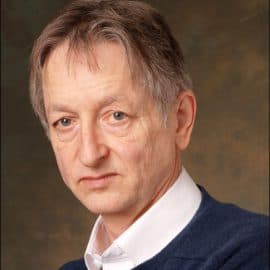


| Personal Brand Presence | 7 / 10 |
| Authoritativeness | 6 / 10 |
| Expertise | 9 / 10 |
| Influence | 7 / 10 |
| Overall Rating | 7 / 10 |
British-Canadian computer scientist and cognitive psychologist Geoffrey Everest Hinton is well-known for his research on artificial neural networks. He split his time between Google (Google Brain) and the University of Toronto from 2013 to 2023. In May of 2023, he made his resignation from Google publicly known, expressing worries about the potential hazards associated with artificial intelligence (AI) technology. He became the principal scientific advisor and co-founder of the Toronto-based Vector Institute in 2017.
Although they weren’t the first to suggest the method, Hinton co-wrote a widely referenced 1986 paper with David Rumelhart and Ronald J. Williams that popularized the backpropagation technique for multi-layer neural network training. Within the deep learning community, Hinton is considered a prominent person. Computer vision made strides forward with the stunning image-recognition milestone of the AlexNet, which he and his students Ilya Sutskever and Alex Krizhevsky created for the 2012 ImageNet competition.
Along with Yoshua Bengio and Yann LeCun, Hinton was awarded the 2018 Turing Award, sometimes known as the “Nobel Prize of Computing,” in recognition of their contributions to the field of deep learning. They have continued to give public speeches together and are frequently referred to as the “Godfathers of Deep Learning”.
In 2023, Hinton voiced worries on the fast advancement of artificial intelligence (A.I.). Previously, Hinton thought that AGI would be “30 to 50 years or even longer away.” But in an interview with CBS in March 2023, he predicted that “general-purpose AI” may arrive in less than 20 years and bring about changes “comparable in scale with the Industrial Revolution or electricity.”
Hinton announced his retirement from Google in an interview with The New York Times that was published on May 1, 2023, stating that he wanted to “talk about the dangers of AI without considering how this impacts Google.” Because of his worries, he said that “a part of him now regrets his life’s work” and voiced his fears of a Google-Microsoft race.
Hinton stated in a May 2023 interview with the BBC that artificial intelligence (AI) may soon surpass the human brain’s capacity for information. “Quite scary” was how he put some of the threats these chatbots represent. Hinton clarified that chatbots are capable of sharing knowledge and learning on their own. This implies that new information is immediately shared with all copies once one copy obtains it. Because of this, artificial intelligence chatbots are able to learn significantly more than a human could.
Solana has demonstrated strong performance, driven by increasing adoption, institutional interest, and key partnerships, while facing potential ...
Know MoreIn April 2025, the crypto space focused on strengthening core infrastructure, with Ethereum preparing for the Pectra ...
Know More